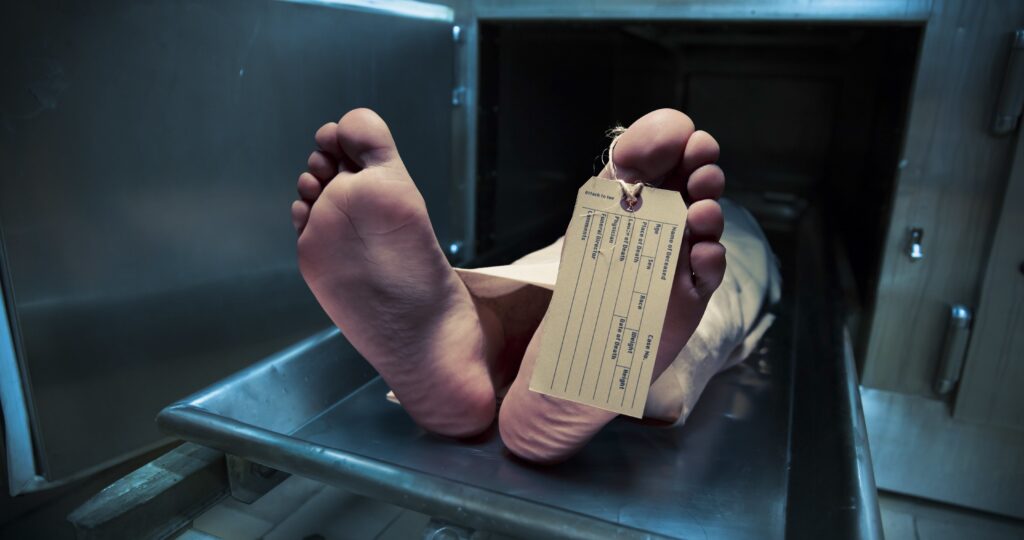How Long Does It Take For A Body To Decompose?

The image of a decomposing human body is the stuff of nightmares for many. For years, it has been utilized in countless horror films, T.V. shows, and other media to great effect. Despite that, this natural repulsion is often times accompanied by considerable intrigue.
Morbid curiosity is what keeps us coming back to those same films, and leads ordinary people to begin questioning certain aspects of what exactly happens to our bodies once we’ve passed on.
Fortunately for us, scientists have handled the research on their end and can answer the questions that we have on the subject, namely the question that nearly everyone has wondered at one point or another: “How long does it take for a body to decompose?”.
What Is Body Decomposition?
Body decomposition is the process of the breaking down of human remains into simple organic matter as time passes. There are a large number of factors that directly affect how a body decomposes, but they can generally be broken down into 2 main categories; time lapsed and environment.
The 5 Stages of Body Decomposition
When learning about out how long it takes for a body to decompose, it is important to also understand the 5 stages of decomposition in humans.
Stage 1 – Fresh
Immediately following death, the Fresh stage begins. In this stage, the body is cold but still intact. This is also when livor mortis begins, in which blood accumulates to whichever side of the body is pointing towards the ground.
Stage 2 – Bloat
The Bloat stage is named as such for one specific reason; bacteria inside of the body emits gases, causing the body to bloat. The skin can begin to turn green and black during this stage. The ghastly sight of remains exiting through the mouth and nose may also occur at this point.
Stage 3 – Active Decay
Throughout Active Decay, bacteria and insects, namely maggots, begin feasting on the human remains. Because of this, the tissue begins to liquefy causing a significant loss of mass, and an increased presence of biohazards.
Stage 4 – Advanced Decay
Most soft tissues are gone during Advanced Decay. If there is any skin remaining it has turned leathery and dry. By this time, the skeleton is visible. Other larger insects, such as beetles, help break down the remains during this stage, as they are able to decompose the tougher soft tissue.
Stage 5 – Skeletal Remains
This is the final stage of the decomposition process. Bones break down due to a variety of factors, including acidic soil, the flow of water, or being chewed by scavengers.
Timeline Of Body Decomposition
The following timeline generally demonstrates how long it takes for a body to decompose.
0-72 Hours After Death
- Rigor mortis
- Temperature drop
- Cell death
- Putrefaction starts
3-10 Days After Death
- Skin discoloration
- Bloating
- Liquid discharge
10-25 Days After Death

- Skin blackens
- Strong odor
- Loss of most liquid
25-60 Days After Death
- Hair and nails broken down
- Loss of soft tissue mass
- Bones exposed
2 Months And On
- Loss of remaining dried skin
- Loss of hair and some teeth
- Skeletonization
Environmental Effects On Decomposition
 The environment that the remains are left in greatly affect how long it takes for a body to decompose. If left in the cold, decomposition is slowed. A reason for this is that bacterial growth is much slower in colder temperatures, and in extreme cold bacterial activity can be near non-existent.
The environment that the remains are left in greatly affect how long it takes for a body to decompose. If left in the cold, decomposition is slowed. A reason for this is that bacterial growth is much slower in colder temperatures, and in extreme cold bacterial activity can be near non-existent.
Conversely, in warm environments, the process is typically quickened. Heat aids in breaking down organic matter, as well as bacteria thriving in warmer temperatures. Other factors that can influence the rate of decomposition as well, including submarine environments, sunlight availability, and more.
Unattended deaths can also have unique interactions with the environment, leaving quite the mess, to say the least. If you or someone you know is left with the unenviable task of cleaning up after a death, call National Crime Scene Cleanup today. Body decomposition, even if for just a few hours, can leave behind a foul, and sometimes dangerous mess. Do not risk illness or traumatizing yourself with the cleanup. National Crime Scene Cleanup is available 24/7, nationwide for assistance.
